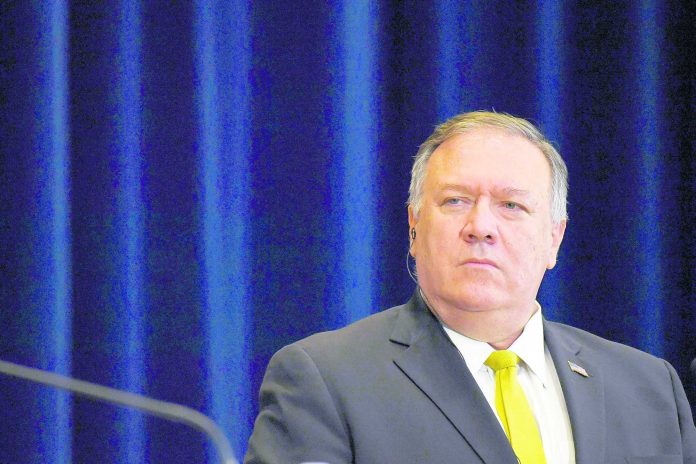The Trump administration on Thursday formally notified the United Nations of its demand for all U.N. sanctions on Iran to be restored, setting off an immediate confrontation with Russia and other Security Council members who called the U.S. move illegal.
Secretary of State Mike Pompeo delivered the notification to the president of the U.N. Security Council, citing significant Iranian violations of the 2015 nuclear deal, a requirement to “snap back” U.N. sanctions.
Pompeo tweeted: “The United States is determined to make sure that the Iranian regime doesn’t have the capacity to inflict even more harm on the world.”
Russian deputy U.N. ambassador Dmitry Polyansky shot back: “Looks like there are 2 planets. A fictional dog-eat-dog one where US pretends it can do whatever it wants without ‘cajoling’ anyone, breach and leave deals but still benefit from them, and another one where the rest of the world lives and where intl law and diplomacy reign.”
At the heart of the showdown in the U.N.’s most powerful body is President Donald Trump’s 2018 withdrawal from the 2015 nuclear deal between six global powers and Iran.
The U.S. maintains that under the Security Council resolution endorsing the agreement it retains the right as an initial party to invoke the provision to “snap back” sanctions. Russia, China, Britain, France and virtually all other council members say the Trump administration does not have the right since it is no longer a party to the Joint Comprehensive Plan of Action, or JCPOA.
The U.S. action sets the stage for a showdown that could lead to a crisis of credibility for the Security Council.
Even before Pompeo presented the council president with the notice, other members rejected the step.
In a letter presented to Indonesia’s ambassador to the U.N., Dian Triansyah Djani, whose country currently holds the rotating presidency of the council, Pompeo said the U.S. was notifying the body of “significant non-performance” by Iran related to the nuclear deal. As a result, Pompeo said the process leading to the re-imposition of U.N. sanctions had been initiated.
The U.N.’s nuclear watchdog, the International Atomic Energy Agency, has reported some Iranian violations of the agreement, but Tehran says those are the result of the U.S. violating the accord by withdrawing from it and then re-imposing harsh unilateral sanctions.
Pompeo noted that the European participants in the deal had attempted to bring Iran back into compliance. But he said “despite extensive efforts and exhaustive diplomacy on the part of those member states, Iran’s significant non-performance persists.”
“As a result, the United States is left with no choice but to notify the council that Iran is in significant non-performance of its JCPOA commitments,” Pompeo wrote.
Pompeo’s letter was accompanied by a six-page explanation of why the U.S. believes it retains the right to invoke snapback.
The U.S. insistence that it can authorize snapback had already been rejected by virtually all other members of the 15-nation council. Germany, a participant in the Iran deal but not a council member, is also opposed.
“France, Germany and the United Kingdom note that the US ceased to be a participant to the JCPOA following their withdrawal from the deal on May 8, 2018,” the group said in a statement released after Pompeo presented the letter. “We cannot therefore support this action which is incompatible with our current efforts to support the JCPOA.”
Russian Ambassador to the U.N. Vassily Nebenzia said: “We do not take it that they have the legal right or the reason to initiate this. “So, of course, we will challenge it.”
China has said it agrees with the Russian position, and Iranian Foreign Minister Mohammad Javad Zarif told U.N. chief António Guterres in a Thursday phone call that the Security Council must resist the U.S. demand.
“This would have dangerous consequences for international law, it will bring nothing but the destruction of international mechanisms and it will discredit the Security Council,” Zarif said.
Under the terms of the Security Council resolution that enshrined the nuclear deal, Thursday’s notification starts a 30-day clock after which pre-2015 U.N. sanctions on Iran that were eased will be re-imposed unless a resolution specifically extending their suspension is passed. The U.S., however, would use its veto power to block any resolution extending the sanctions relief.
Because of the legal debate over U.S. standing, it is possible that the snapback demand will simply be ignored by the other members, which could call into question the Security Council’s relevance and ability to enforce its own legally binding decisions.
Trump and Pompeo had made no secret of their intention to pursue snapback, particularly after the administration’s embarrassing defeat last week at the Security Council on extending the arms embargo on Iran that expires in October. The U.S. won just one other “yes” vote, with China and Russia opposed and the 11 other members abstaining.
U.S. allies Britain and France are hoping to preserve the nuclear deal in the event Trump loses his bid for a second term in November’s presidential election. Democratic Joe Biden has said he would try to revive the agreement.
The Europeans fear that the re-imposition of sanctions may lead Iran to quit the deal entirely and plow ahead with efforts to develop atomic weapons. The Trump administration says it withdrew precisely because it eased sanctions, opening major revenue streams for Iran while gradually easing restrictions on its nuclear activities that money could pay for.




















